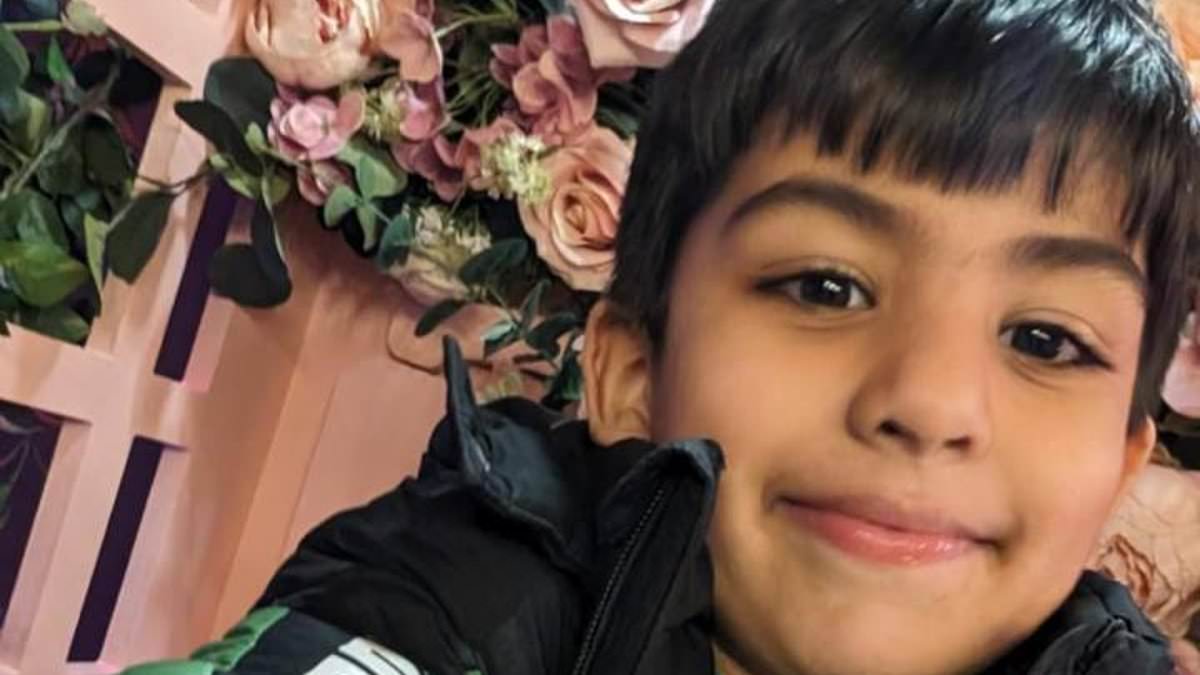A young boy has been diagnosed with a rare, life-changing disorder that only affects one in one million people in the world – after his mother’s concerns were repeatedly dismissed by doctors.
Michelle Goldthorpe, 38, from Hemel Hempstead, Hertfordshire, said she’s sharing her and son Taylor’s medical ordeal in the hope it will inspire other parents to ‘push for answers for their kids’.
Michelle was convinced there was something wrong with Taylor after he was born, but doctors insisted her fears were the result of post-natal depression.
Now, at the age of four, Taylor has been diagnosed with a life-changing disorder that has left him unable to eat and with a non-functioning immune system.
Michelle had been worried that there was something was wrong with Taylor’s health for several years, explaining how he had been in and out of hospitals since he was nine months old after suffering bronchiolitis and various infections.

A young boy (pictured) has been diagnosed with a life-changing disorder which only affects one in one million people in the world – despite initially being dismissed by doctors

Taylor, four, pictured with his sister, Lily. His mother had been fearful something was wrong with Taylor’s health for several years, after he kept contracting bronchiolitis on an almost-fortnightly basis
It was only after Taylor was rushed to hospital with an enlarged spleen and irregular bloods in February 2021 that he was diagnosed with activated PI3K-delta syndrome (APDS) – a one-in-a-million disorder that severely impairs the immune system.
Since his family received the devastating diagnosis, Taylor has spent the last eight months in hospital, where he has endured a nasty infection that resulted in him having gut problems as well as chronic diarrhoea.
While he is currently unable to eat, his parents, Michelle and Paul, 44, are hopeful they will be able to bring their son home in the new year.
However, Taylor will still need a bone marrow transplant to help restore the functioning of his immune system.
Despite everything the toddler has been through, Michelle said of her son: ‘He’s such a happy little boy.
‘He’s cheeky. He gets his grumps.’
In fact, Michelle added, she and her husband Paul look to their son for strength to keep going in the face of his health challenges.

The mother-of-two explained that she had always had an instinct that something was wrong, but was never taken seriously by doctors who put her fears down to post-natal depression

Taylor, who is now four, pictured as a baby. While he is currently unable to eat, his parents, Michelle and Paul, 44, hope they can bring him home in the new year


Taylor pictured as a baby. He started having to take trips to the hospital when he was just five months old and started to contract bronchiolitis on an almost-fortnightly basis

It was only when Taylor was taken to hospital for an enlarged spleen and irregular bloods, that Taylor was transferred to Great Ormond Street Hospital (GOSH) in London
Activated PI3K delta syndrome (APDS) is a rare primary immunodeficiency.
Around 30–40 people in the UK are known to be affected by the condition, according to Immuno Deficiency UK.
APDS is an inherited disorder that affects both men and women – it was first discovered in 2013.
People with APDS can’t fight infections because their immune system does not work properly.
White blood cells are abnormal and can’t recognise and attack bacteria and viruses to prevent infection.
‘The only thing that keeps us going is Taylor,’ said his mother.
Michelle said she began taking her son to hospital when he was only five months old, but things took a turn for the worse when Taylor started to contract bronchiolitis on an almost-fortnightly basis.
She recalled taking him to hospital every two weeks with the condition, which is a lung infection that affects young children and infants, up until he turned nine months old.
Despite their repeat visits to the hospital, Michelle kept being told by professionals that nothing was wrong with Taylor.
‘I was told it was just bronchiolitis and that it was my post-natal depression,’ she explained.
In February 2021, Taylor was rushed to hospital in an ambulance after he stopped feeding, and ended up being admitted with an enlarged spleen.
During the hospital stay, Michelle and Paul had an appointment with a haematologist who said Taylor could have juvenile leukaemia, before they were transferred to the Great Ormond Street Hospital (GOSH) in London.
His parents were told he would need a bone marrow examination to test for different illnesses but, in March 2021, Taylor was admitted to hospital with tonsillitis and a chest infection and couldn’t undergo the operation.
The procedure was finally performed in April 2021, before Taylor was diagnosed with APDS, which impairs the immune system, and Short Syndrome – which causes short stature – later that month.
Michelle recalled asking: ‘Is this a life-limiting illness?’
‘They said “if he gets a bad infection then, yes, he could die”. My mind was going wild.
‘He is the size of an 18-month-old even though he is four.
‘He has a global development delay – a learning age of two-and-a-half to three-and-a-half.’
Taylor had to have a feeding tube inserted in his nose in May 2021 after he contracted an infection and wasn’t eating.
He caught a respiratory virus in June 2021 and had to be blue lighted to GOSH after turning yellow and becoming anaemic.
Michelle said: ‘I said “Could he die?”. And they said “We don’t know”.’
Taylor was then fitted with a PICC line (a line inserted into the arm) and put on immunoglobulin replacement therapy to give him antibodies.
This and other medication had been working up until March 2023, when Taylor caught the Epstein-Barr virus and spent two weeks in hospital.
Then, in February this year, Taylor was left with an infection in his stool after he refused to wash his hands, which caused an inflammation in his body and chronic diarrhoea.

Michelle began taking her son to hospital when he was only five months old. But things only went from bad to worse when Taylor started to contract bronchiolitis on an almost-fortnightly basis

Taylor pictured with his father, Paul, 44.The youngster has endured a number of health conditions throughout his life

Despite their persistent visits to the hospital, Michelle kept being told by professionals that there was nothing wrong

‘The only thing that keeps us going is Taylor,’ said his mother Michelle, whose concerns were initially dismissed as postnatal depression (pictured L-R: Lily; Paul; and Taylor)

The cure for Taylor’s illness is a bone marrow transplant – which his parents hadn’t wanted to put him through until now
Since then, Taylor has spent the last eight months in GOSH and is on Total parenteral nutrition (TPN) which is where nutrients are fed through a vein.
The family is hoping to take Taylor home, and continue his TPN there, but will need proper training and NHS funding to do so.
The cure for his illness is a bone marrow transplant – which his parents hadn’t wanted to put him through until now.
Michelle said: ‘We want to get him home so he can lead a normal life.

Doctors have always advised the parents to let Taylor have as normal life as possible – and the family have previously taken him to Legoland and on UK trips

Michelle said: ‘He’s so resilient. I want to get his story out there for parents to push for answers for their kids’
‘The transplant might not cure the gut problems but I’m hoping he’ll be able to eat food again.’
Doctors have always advised Taylor’s parents to give him as normal a life as possible – and the family have previously taken him to Legoland and on trips around the UK.
Michelle said: ‘They said we have to let him mix. He loves the train.’
The family are hoping to bring Taylor home in the new year, before they then look at a transplant for him.
Michelle said: ‘He’s so resilient. I want to get his story out there for parents to push for answers for their kids.’










